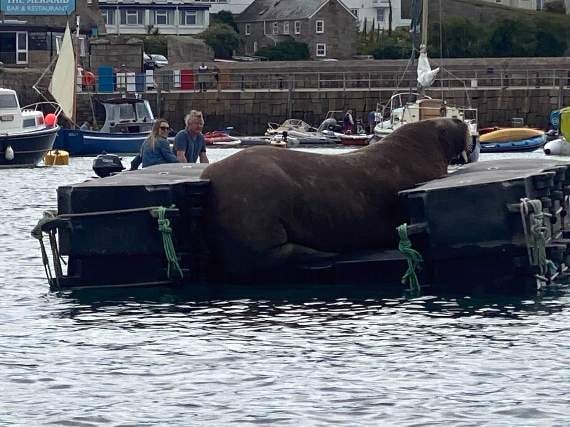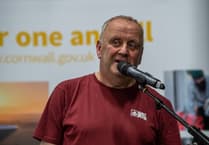For boat owners and visitors who may be venturing west to the Isles of Scilly this summer, harbour authorities and wildlife groups have issued advice and guidance concerning the Arctic walrus – christened by locals Wally - which has made a rare expedition into southern waters and is having a prolonged stay in the islands.
The advice comes from organisations British Divers Marine Life Rescue (BDMLR), the Isles of Scilly Wildlife Trust, Cornwall Seal Group Research Trust and St Mary’s Harbour Team and was accurate at the time of writing – Monday, July 12 – and will be updated as new details emerge or there is new information about Wally to report. These organisations are all involved in monitoring the walrus’s behaviour and implementing strategies to ensure his safety and limit damage to property such as boats.
British Divers Marine Life Rescue’s Assistant Area Coordinator Lizzi Larbalestier is on the islands to support the Isles of Scilly Wildlife Trust and Harbour Authority to assist in assessing, monitoring and mitigating activity and provide real time updates to dynamically risk assess the situation. This team have the backing and support of all the other organisations involved.
The key points of the advice are as follows:
- Boat owners are strongly advised to stop the Walrus from hauling out on boats by blocking access with temporary barriers and obstructions;
-It’s important that the purpose-built pontoon becomes the Walrus’ “safe space”, something that he returns to, allowing him to rest, gain strength and ultimately leave Scilly to continue his journey home;
- Please do not disturb the Walrus; keep your distance (a minimum of 50-100m);
- When collecting/returning your boat to your moorings do so in a way that minimises disturbance to the Walrus on the pontoon;
- Please do not divert your path, or set your course, to pass the Walrus closely, or move directly towards him.
No-one knows why Wally the walrus has come so far south, but it is well known that climate change is melting the Arctic ice the walruses haul themselves onto, and young male walruses do wander and explore. Cornwall Seal Group Research Trust’s Sue Sayer has spoken to an Alaskan Walrus expert Lori Quakenbush who thinks that the walrus has probably come from the Arctic island of Svalbard, north of Norway and more than 3,200km from the Isles of Scilly.
Before settling on Scilly for his prolonged stay Wally visited Ireland, Wales, Cornwall, France and Spain.
Sue says: “This means in total, our visiting walrus has swum an incredible 4,000km. This will have used up a lot of energy for this young marine mammal.
“What should the walrus be doing? Hanging out in close physical contact with other young walrus around the Svalbard coast. Walrus are highly social creatures and even if there are only two walrus on a beach they will lie touching each other for comfort.”
Considering this walrus’s previous mobility and typical walrus behaviour, Lori Qakenbush expects him to move on from the Isles of Scilly soon, but he will only be able to do so if he has the energy to make the 3,200km journey home. To do this he needs to feed up on invertebrates (clams are walrus’s favourite food) and to rest peacefully without interruption.
If he is continually distracted he will not gain the weight and energy for the long journey and will remain in Scilly longer. He is feeding well but his rest has not been consistently good.
He is thought to have chosen a busy harbour to rest in because of his gregarious nature and natural need for company - and his previous preference for warm, spongy rib-type boats may be because he misses contact with his walrus companions. The pontoon he is currently revisiting has been specially adapted to make him feel safe so boat owners are being urged not to disturb him by coming close to the pontoon out of curiosity.
The overall advice is please stay away from him - although not normally aggressive he is a large, bulky animal and there is a risk that if he is spooked an accident could occur.
Cornwall Seal Group Research Trust have a great article which explains why giving seals (and this applies to a Walrus too) space is so important: visit https://www.cornwallsealgroup.co.uk/2021/04/give-seals-space/




